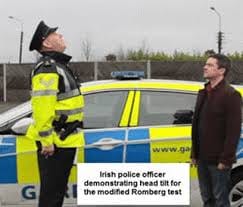 The National Highway Traffic Safety Administration has approved three Field Sobriety Tests for use in DWI prosecutions. If the defendant provides a chemical sample of breath or blood, the FSTs simply establish probable cause for administering the test. Probable cause is not a very high standard. It’s not much more than an evidence-based hunch.
The National Highway Traffic Safety Administration has approved three Field Sobriety Tests for use in DWI prosecutions. If the defendant provides a chemical sample of breath or blood, the FSTs simply establish probable cause for administering the test. Probable cause is not a very high standard. It’s not much more than an evidence-based hunch.
But if the defendant does not provide a sample, Tarrant County prosecutors must use the FSTs to establish guilt beyond a reasonable doubt. That’s a much higher standard. In these situations, if the officers administer unapproved tests, how should a DWI defense attorney respond?
The Two Most Common Unapproved FSTs
Many officers have defendants perform some variation of the Finger-to-Nose test. Defendants must tilt their heads back and touch the tips of their noses with the tips of their index fingers. Many officers also have defendants count or recite part of the alphabet while they perform this test.
The Romberg Balance test is somewhat common as well. German Dr. Moritz Romberg invented this test in the early 1800s. Defendants must close their eyes and stand still while they silently count thirty seconds.
These tests appear sophisticated, but they have no scientific basis in a DWI arrest context. That lack of evidence gives an attorney several options.
Should a Lawyer Exclude Them?
Since unapproved tests have no scientific merit, it may be possible to exclude them under the rules of evidence. Evidence is only admissible if its probative value outweighs its prejudicial (harmful) effect. When it comes to the Romberg and FNT tests, the balance favors the defendant.
Without scientific merit, these tests do not make intoxication or sobriety more or less relevant in any measurable way. Furthermore, Tarrant County jurors may look at footage from these tests and erroneously conclude that the defendant is intoxicated.
In general, the less evidence the prosecutor has, the better. But that’s only a general rule. In this instance, it might be better for the jury to view this video footage.
The Case for Letting the Jury View the Tape
A judge will probably include a limiting instruction regarding these tests and their lack of foundation. If the judge does so, it may be best to let the jurors view the footage.
Doing so gives an attorney a chance to look smart. For example, the Romberg test relies on a balance of proprioception (knowing one’s position in space), vestibular function (knowing the position of one’s head) and vision. Knowledge of scientific terms like these make an attorney look like an expert in the field of intoxication. More credibility is always a good thing.
Additionally, if the police officer is unfamiliar with these terms, the jury may conclude that the officer was not competent to administer and evaluate the other tests. Such a conclusion makes it almost impossible for jurors to conclude that, based on the FSTs, the defendant was guilty beyond a reasonable doubt.
If nothing else, the jury may conclude that the officer administered useless tests just to force the defendant to jump through hoops.
If an arresting officer administers unapproved field sobriety tests, that’s normally a good thing. For a free consultation with an experienced criminal defense lawyer in Fort Worth, contact Herreth Law. We routinely handle matters in Tarrant County and nearby jurisdictions.

